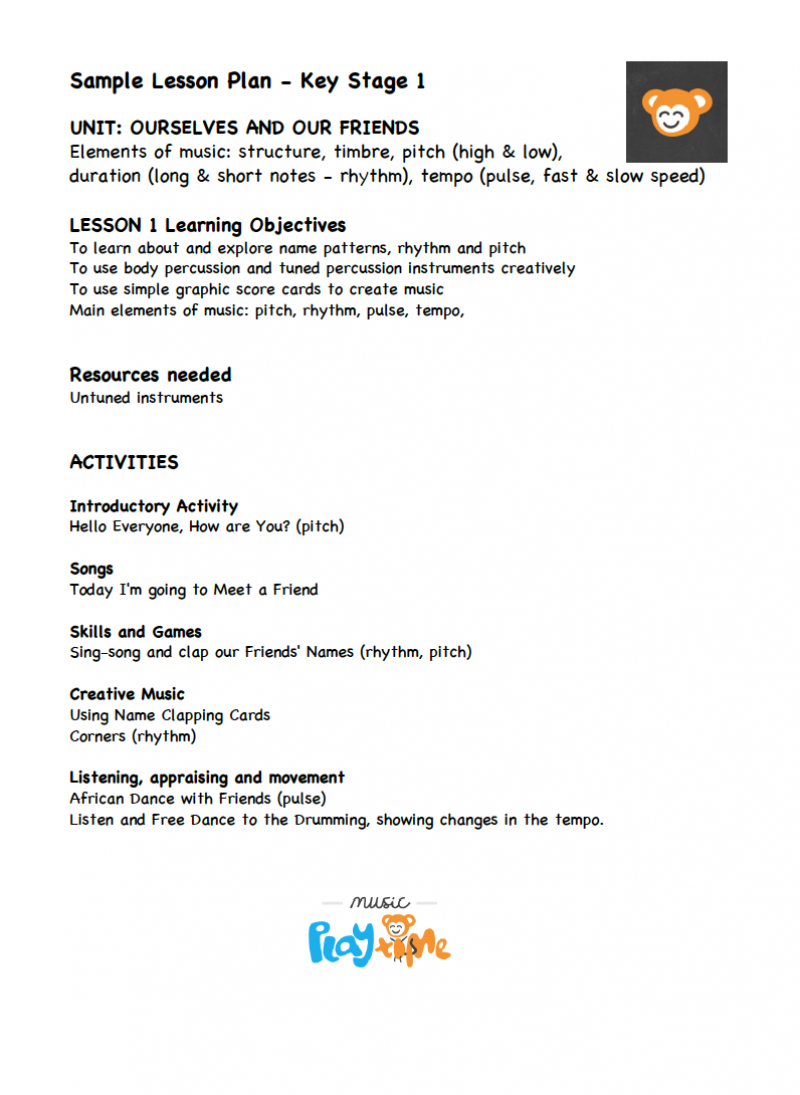Planning music lessons for young children
Music Playtime is a complete, music scheme based on the most popular topics. You can subscribe to Early Years/Reception OR to Key Stage 1, OR to both at a discount price. The topics have the same titles for Early Years/Reception and KS1 but the focus, activities and difficulty level are different so the scheme may be started in the Early Years and continue through KS1 with no repetition. Access to the complete scheme facilitates inclusivity for many SEND pupils at KS1, with everyone enjoying the same topic at their own level.
The Topics are Medium Term Plans
Every topic is a medium-term plan and has plenty of material for several lessons so all you need to do is follow the easy guide below to plan in more detail week by week. There are enough topics for two per term - and some to spare so you have a choice. Each topic covers the complete range of activities: Introductory activities, Songs and chants, Skills and games, Creative work, Listening and movement, Cross-curricular activities. The most important musical concepts and skills are all taken care of by Music Playtime.
Weekly Lesson Plans
Early Years children enjoy and learn best from daily, bite-sized music activities with lots of repetition. At Key Stage 1, lessons can include several, linked activities and more structured lesson plans are needed. The sample lesson plans with assessment criteria for KS1 (downloadable at the start of the Ourselves and Our Friends unit) show how easy it is for you to make your own plans using Music Playtime - the activities are clearly categorised, and relevant Elements of Music are given. Here's an example of a weekly lesson plan:

A weekly music lesson length of 60 minutes, possibly divided into shorter sessions, is thought (according to the UK Model Music Curriculum) to be sufficient for Key Stage 1 children (I actually find that children want to carry on for longer). Sometimes, you'll cover more, or less, than intended - or you'll go with inspirational flow into a completely unplanned activity. I believe that, after the initial lesson in a series, being responsive as well as proactive within the broad outline is the best way to teach.
How to get started with your plans
The most useful section for you to look at is the set of three sample lesson plans, followed by criteria for assessment, at the start of the first KS1 unit, Ourselves and our Friends. (You need to be subscribed for this.) These form a template for how teachers can use the linked activities in each unit of Music Playtime to create lesson plans that fit in with their own school day and term. Each unit of Music Playtime (ie Ourselves and Our Friends, Pets and Other Animals etc) is a medium-term plan from which teachers create their weekly plans. A set of lesson plans may cover from three to six or seven weeks. The idea is that the plans should be structured yet allow for flexibility - if children say they want to do an activity again I like to go with their enthusiasm and, if something doesn't feel right for a particular group, I may cut it short and just not do it again with that class. For this reason, I don't like to finalise the weekly plans too far ahead.
To access this set of plans, please click on Ourselves and Our Friends, KS1 then scroll to the Downloads where you will see the file named 'Sample Lesson Plan KS1 Ourselves'. It's a good idea, in most lessons, to follow the structure: Introductory Activities, Songs and Chants, Skills and Games, and so on. Aim to include each of these sections over the course of a term even you can't fit them all into every lesson. The three plans show how to begin the activities and then consolidate them - for example, for African Dance with Friends, you begin with free dance to African Drumming then progress to a taught African dance (Market Dance), then later another instrument is added to that dance accompaniment, giving an extra layer of complexity.
The three sample lessons include some, but not all of, the activities in the first KS1 unit. Including more of the activities as well as consolidating, practising, and extending the known ones ensures that you will have plenty of material in each unit to cover a half term.